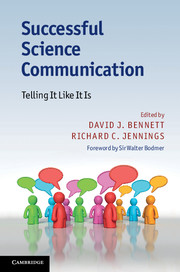Book contents
- Frontmatter
- Contents
- Foreword
- Authors' biographies
- Introduction Public engagement in an evolving science policy landscape
- Part I What it helps to know beforehand
- Part II Policy-makers, the media and public interest organisations
- Part III What you can do and how to do it
- Part IV And finally, evaluating and embedding science communication
- Index
- Plate section
- References
Introduction - Public engagement in an evolving science policy landscape
Published online by Cambridge University Press: 05 May 2013
- Frontmatter
- Contents
- Foreword
- Authors' biographies
- Introduction Public engagement in an evolving science policy landscape
- Part I What it helps to know beforehand
- Part II Policy-makers, the media and public interest organisations
- Part III What you can do and how to do it
- Part IV And finally, evaluating and embedding science communication
- Index
- Plate section
- References
Summary
Why public engagement with science matters
Many scientists think what they do is more important than anything else in the world. Science, in their view, is a system that provides an unrivalled way of thinking about the universe. They see the last five hundred years as a story of a world improved, indeed transformed, through science, and they look forward to a future defined by science's further advances. When we talk about the importance of communicating science, this enthusiasm of scientists for the intellectual, historical and practical importance of their subject is a good place to start. So, for many, it is with conveying the passion for science that science communication should begin. The Triple Helix, an undergraduate-run worldwide forum for science in society, and the Open Research Laboratory at the Munich Deutsches Museum described in other chapters of this book are perfect examples of such enthusiasm-stimulated activities.
This entirely positive view of science is, of course, not universally shared. The perception of a popular antipathy to some aspects of science means that defensiveness, as well as enthusiasm, can be seen as a motivation for communicating science to the public. This aspect of science communication comes to the fore when controversial issues hit the headlines; this gives rise to a reactive mode of science communication, in which it is seen as a tool for coping with science policy crises. This reaction can even occur in anticipation of crises, as we have seen with nanotechnology and synthetic biology.
Information
- Type
- Chapter
- Information
- Successful Science CommunicationTelling It Like It Is, pp. 1 - 14Publisher: Cambridge University PressPrint publication year: 2011
References
Accessibility standard: Unknown
Why this information is here
This section outlines the accessibility features of this content - including support for screen readers, full keyboard navigation and high-contrast display options. This may not be relevant for you.Accessibility Information
- 4
- Cited by
